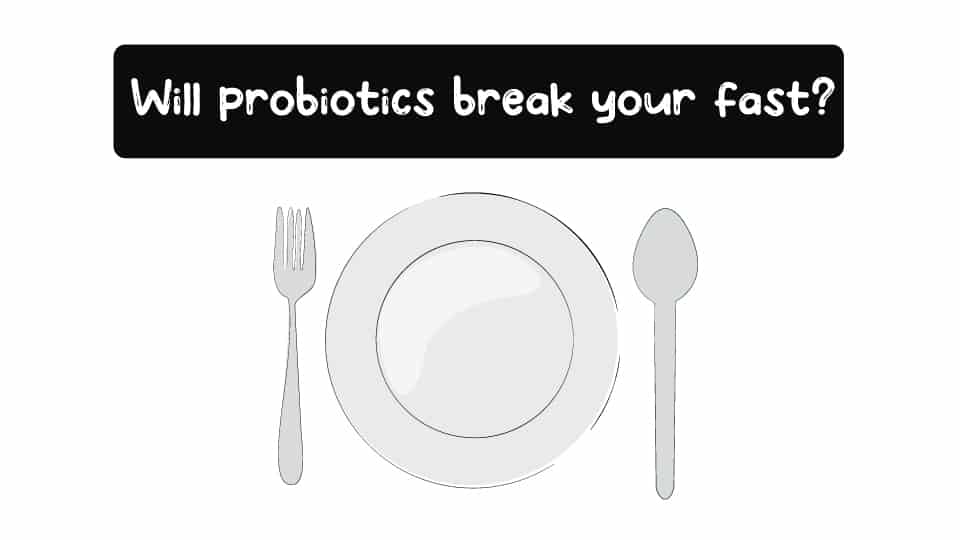Do Probiotics Break A Fast? In Some Cases, Yes

Probiotics will break a fast during Ramadan for example but not during intermittent fasting since probiotic bacteria do not contain any calories.
Probiotic bacteria are live microorganisms that, when consumed in adequate amounts, confer health benefits to the host by improving the balance of beneficial bacteria in the gut.
Fasting is the voluntary abstention from food and, at times, drink for a specific period, often undertaken for various health, religious, or ethical reasons.
What Is Fasting?
To put it simply, fasting involves refraining from food and sometimes beverages for a set time, serving various purposes like health, religious, or ethical reasons, with fasting options ranging from complete abstinence to intermittent periods, recognized for potential benefits such as fat burning, better blood sugar control, reduced inflammation, and even spiritual significance for some individuals. If you do decide that you want to fast then you should always consult with your doctor first and make sure to drink plenty of fluids unless you are also doing a water fast.
Fasting Benefits
Fasting offers a range of health advantages like enhanced cognitive performance, protection against obesity and associated chronic diseases, reduced inflammation, improved overall fitness, support for weight loss, a decreased risk of metabolic diseases, and potential benefits like better blood sugar control. Fasting can also aid in losing body weight and lowering the risk of obesity-related diseases such as diabetes. Fasting supports various aspects of health, including hormones, genes influencing metabolism, and mental health, by rejuvenating the body and promoting the dissolution of diseased cells, leaving behind healthier tissue. These benefits are backed by scientific research and underscore the multifaceted advantages associated with fasting.
Fasting Downsides
While fasting may have its benefits there are also downsides to be aware of. These downsides include experiencing hunger, fatigue, insomnia, irritability, headaches, nausea, and cravings, which can be challenging for individuals not accustomed to skipping meals or prolonged periods without eating. Fasting may not be suitable for everyone, especially those with certain medical conditions such as diabetes, and it may lead to a reduction in physical activity for some individuals participating in intermittent fasting programs. Moreover, there are reports of minimal weight loss associated with certain forms of intermittent fasting, and long fasting periods can potentially lower blood sugar levels, resulting in lightheadedness, dizziness, headaches, and nausea.
Do Probiotics Break A Fast?
Probiotic capsules do no break a fast if they contain only probiotic bacteria provided you are not fasting for religious reasons. Some probiotic foods, such as yogurt, kombucha, kefir, and tempeh, contain calories and could potentially break a fast if consumed during fasting periods because they contain calories.
Probiotic supplements, particularly those with no calorie content, are considered safe to take while fasting and are unlikely to trigger insulin responses or digestive processes that disrupt the fasting state. You should check labels and choose probiotic products carefully to ensure they do not contain significant calories if fasting is a concern to be safe.
Can You Take Probiotics While Water Fasting?
Water fasting is a dietary practice in which an individual consumes only water and abstains from all other foods and beverages for a specified period, typically for health, detoxification, or religious reasons. Because of this, it's actually a good idea to take probiotics during a water fast to help with your nutrition.
Closing Thoughts: Stick To Capsule Probiotics
Sticking to probiotic capsule supplements will allow you not to break your fast and taking them whilst fasting may be beneficial because there won't be other acidic foods in your stomach that can kill the probiotic bacteria. If you are fasting avoid chewing any probiotic gummies and of course, the obvious thing to avoid would be eating a big plate of fermented foods or thick calorie-dense kefir milk.

Alicia Harper is a NASM-CNC Certified nutritionist and the editor of ProbioticReviewGirl.
After suffering from recurrent gut issues she spent years researching Probiotics and the microbiome.
She has tested 29+ different Probiotics and is a probiotics expert. As a probiotic fanatic, she has valuable knowledge to share with the world.